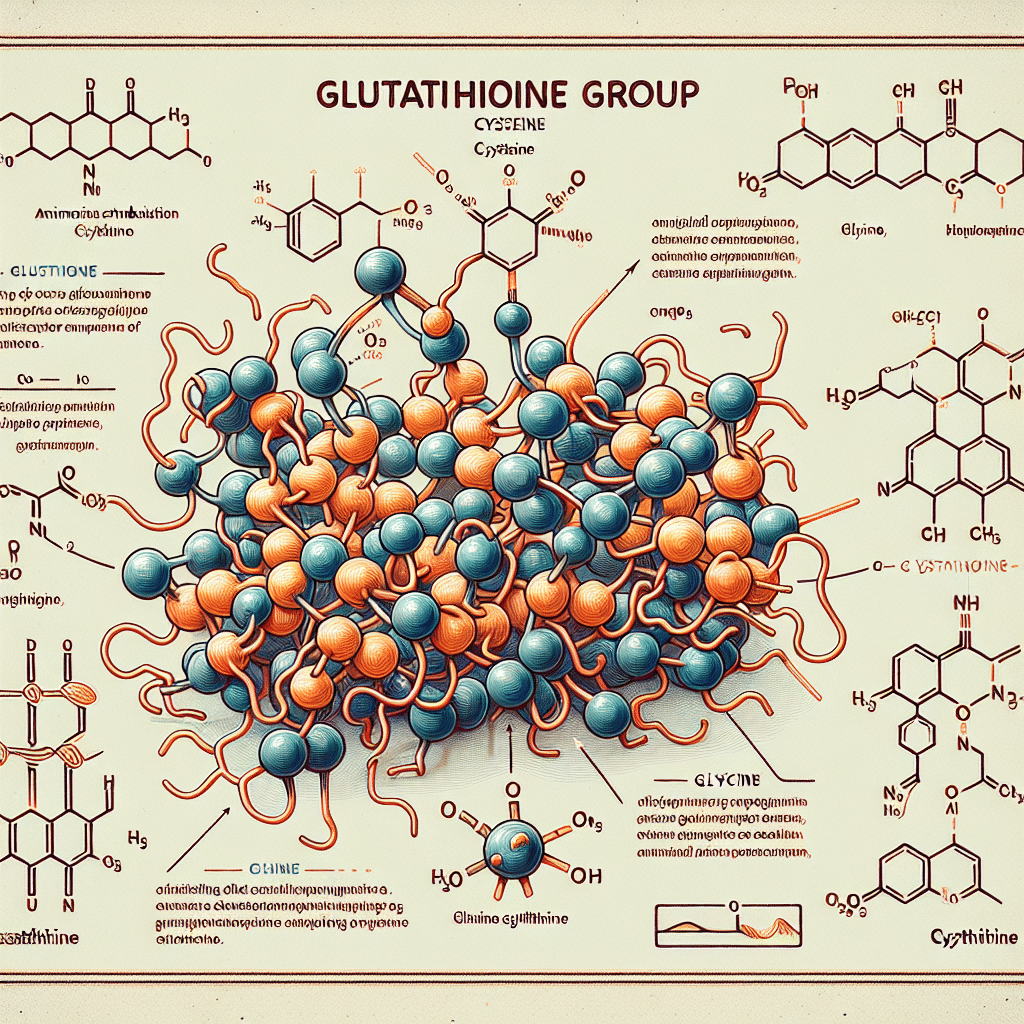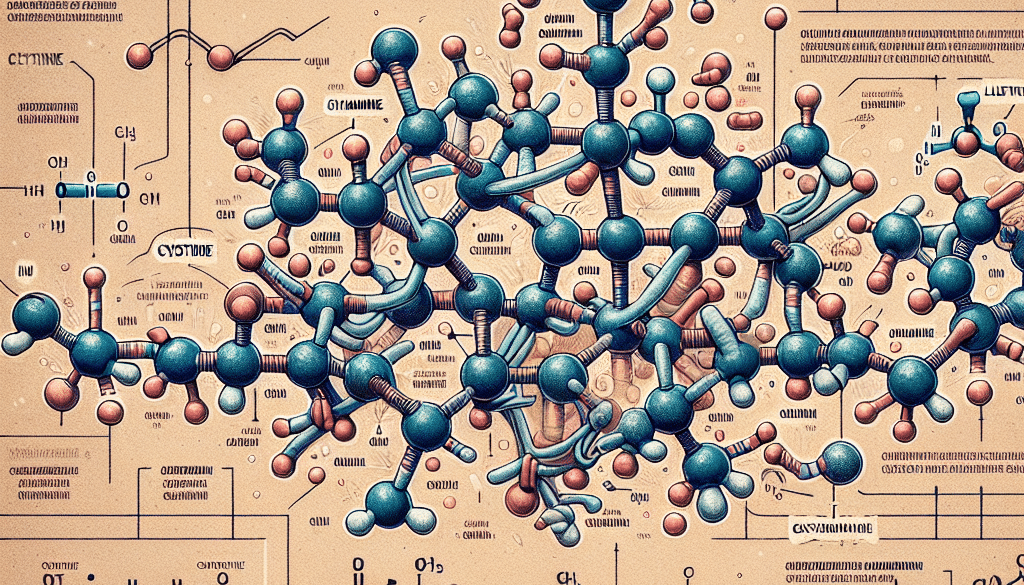Glutathione Group of Cysteine: Explained
-
Table of Contents
- Glutathione and the Cysteine Connection: A Comprehensive Guide
- Understanding Glutathione: The Body’s Antioxidant Defense
- The Role of Cysteine in Glutathione Synthesis
- Factors Affecting Cysteine Availability
- Glutathione Deficiency and Its Implications
- Boosting Glutathione Levels
- Research and Case Studies on Glutathione
- Conclusion: The Power of Glutathione and Cysteine
- Discover ETprotein’s High-Quality Protein Products
Glutathione and the Cysteine Connection: A Comprehensive Guide

Glutathione, often referred to as the “master antioxidant,” is a small molecule found in every cell of the body. It is composed of three amino acids: cysteine, glutamate, and glycine. This tripeptide is crucial for maintaining cellular health, detoxification, and the immune system. The cysteine residue within glutathione is particularly significant due to its sulfur-containing thiol group, which plays a key role in the molecule’s antioxidant properties. In this article, we will delve into the importance of the glutathione group of cysteine, its functions, and its impact on human health.
Understanding Glutathione: The Body’s Antioxidant Defense
Glutathione exists in two forms within the body: the reduced form (GSH) and the oxidized form (GSSG). The ratio of GSH to GSSG within cells is often used as an indicator of cellular oxidative stress. GSH is the active form that can donate electrons to unstable molecules known as free radicals, neutralizing them and preventing cellular damage.
- Detoxification: Glutathione conjugates with toxins, making them more water-soluble and easier for the body to excrete.
- Immune Function: It enhances the proliferation of lymphocytes, which are critical for an effective immune response.
- Antioxidant Protection: Glutathione directly scavenges free radicals and also regenerates other antioxidants, such as vitamins C and E.
- Enzyme Function: It is a cofactor for several antioxidant enzymes, including glutathione peroxidase and glutathione-S-transferase.
- Protein and DNA Synthesis: It is involved in the synthesis and repair of proteins and DNA within the cell.
The Role of Cysteine in Glutathione Synthesis
Cysteine is the rate-limiting precursor in the synthesis of glutathione. This means that the availability of cysteine within the cell largely determines the rate at which glutathione can be produced. The thiol group of cysteine is what gives glutathione its antioxidant properties, as it is responsible for the donation of hydrogen atoms to free radicals.
Factors Affecting Cysteine Availability
- Diet: Consuming foods rich in cysteine, such as poultry, yogurt, eggs, and legumes, can help maintain adequate levels of this amino acid.
- Metabolism: The body can produce cysteine from methionine, another sulfur-containing amino acid, through a series of metabolic reactions.
- Health Conditions: Certain health conditions, such as HIV/AIDS and cancer, can deplete glutathione levels, making cysteine supplementation necessary.
Glutathione Deficiency and Its Implications
Glutathione deficiency can lead to increased oxidative stress and cellular damage. This can manifest in various health issues, including:
- Chronic fatigue syndrome
- Immune system disorders
- Neurodegenerative diseases like Alzheimer’s and Parkinson’s
- Liver diseases
- Cardiovascular problems
Boosting Glutathione Levels
There are several ways to increase glutathione levels in the body:
- Dietary Intake: Eating foods rich in sulfur-containing amino acids, such as cysteine and methionine.
- Supplementation: Taking glutathione supplements, although their effectiveness is debated due to poor absorption.
- Precursor Supplementation: Supplementing with precursors like N-acetylcysteine (NAC) or whey protein, which can boost cysteine and glutathione levels.
- Lifestyle Changes: Engaging in regular exercise and avoiding excessive alcohol consumption can also help maintain healthy glutathione levels.
Research and Case Studies on Glutathione
Several studies have highlighted the importance of glutathione in disease prevention and treatment. For instance, research has shown that glutathione levels are significantly lower in patients with chronic diseases, suggesting a link between glutathione deficiency and disease progression.
In a case study involving patients with Parkinson’s disease, glutathione supplementation was found to improve symptoms and slow disease progression. Another study on cystic fibrosis patients revealed that NAC supplementation led to improved lung function by increasing glutathione levels in lung tissue.
Conclusion: The Power of Glutathione and Cysteine
In conclusion, the glutathione group of cysteine plays a pivotal role in maintaining cellular health and preventing oxidative damage. Adequate levels of cysteine are essential for the synthesis of glutathione, which in turn supports a wide range of bodily functions. From detoxification to immune support, the benefits of glutathione are vast and well-documented. By understanding how to maintain and boost glutathione levels, individuals can take proactive steps towards enhancing their overall health and well-being.
Discover ETprotein’s High-Quality Protein Products
If you’re looking to support your glutathione levels through dietary supplementation, ETprotein offers a range of high-quality protein products that can help. Their selection includes organic rice protein, pea protein, and other plant-based proteins that are rich in cysteine and other amino acids necessary for glutathione synthesis.
ETprotein’s commitment to non-GMO, allergen-free products with high purity ensures that you’re getting the best supplements to meet your health needs. Whether you’re involved in the nutraceutical, pharmaceutical, or food and beverage industry, ETprotein has the protein solutions to support your customers’ health and your business growth.
About ETprotein:
ETprotein, a reputable protein and L-(+)-Ergothioneine (EGT) Chinese factory manufacturer and supplier, is renowned for producing, stocking, exporting, and delivering the highest quality organic bulk vegan proteins and L-(+)-Ergothioneine. They include Organic rice protein, clear rice protein, pea protein, clear pea protein, watermelon seed protein, pumpkin seed protein, sunflower seed protein, mung bean protein, peanut protein, and L-(+)-Ergothioneine EGT Pharmaceutical grade, L-(+)-Ergothioneine EGT food grade, L-(+)-Ergothioneine EGT cosmetic grade, L-(+)-Ergothioneine EGT reference grade and L-(+)-Ergothioneine EGT standard. Their offerings, characterized by a neutral taste, non-GMO, allergen-free attributes, with L-(+)-Ergothioneine purity over 98%, 99%, cater to a diverse range of industries. They serve nutraceutical, pharmaceutical, cosmeceutical, veterinary, as well as food and beverage finished product distributors, traders, and manufacturers across Europe, USA, Canada, Australia, Thailand, Japan, Korea, Brazil, and Chile, among others.
ETprotein specialization includes exporting and delivering tailor-made protein powder and finished nutritional supplements. Their extensive product range covers sectors like Food and Beverage, Sports Nutrition, Weight Management, Dietary Supplements, Health and Wellness Products, and Infant Formula, ensuring comprehensive solutions to meet all your protein needs.
As a trusted company by leading global food and beverage brands and Fortune 500 companies, ETprotein reinforces China’s reputation in the global arena. For more information or to sample their products, please contact them and email sales(at)ETprotein.com today.












